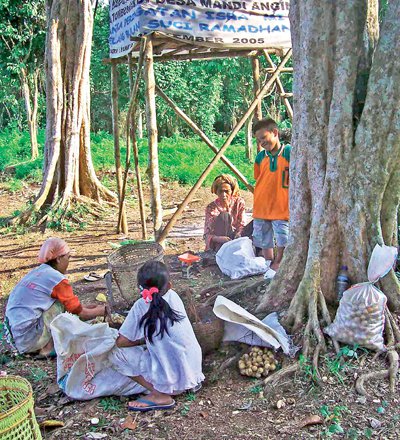Phuket Gardening: Drying the seeds of success

PHUKET: A recent email from Clive in Karon poses a question about seeds. “Why do seeds need to be dried before planting?” he inquires and adds that he has seen lots of them drying in the sun here in Phuket.
The answer is more complex than you might expect. Seeds are produced by most plants and they vary in size from microscopic to the large “stones” of avocados or mangoes. What seeds all possess in common is a degree of residual moisture, even when ripe. In the case of seeds produced inside fleshy fruit such as oranges, papayas and melons, the outside of each pit is initially moist or sticky, and therefore needs to be dried before it can be stored. This is also the case with drupes – soft fruit that usually contain one large stone that protects the seed within.
Exposure to the sun also has the effect of dehydrating the interior of the seed, so that it is less likely to be affected by mold, mildew, or other rotting agencies. Ideally, seeds should retain between three and seven per cent of moisture. In this condition, they can be stored for a year or more. However, if they are too sere or hard, germination will be difficult.
Some seeds are edible, and are dried for preservation and packaging. But if these small seeds are intended to be sown, excessive heat may remove too much moisture. In this case, it is better to dry them slowly.
Larger edible stones, for example the seeds of the areca palm (better known as betel nuts), can be safely left in the tropical sun. Firm and green when fresh, they cure in the heat and attain a wood-like consistency. In this state, betel nuts are very popular as a mild stimulant, and for this reason, are widely consumed throughout Asia. Chilies may also be dried whole, since the entire pod contributes to the fiery taste.
Some fruit and vegetables, however, are eaten in a green state. The seeds of cucumbers, bitter gourds, sataws, peas and beans, for example, are rarely mature enough to be successfully germinated until the flesh is too ripe for eating. Left to their own natural devices, the seeds would only germinate once the protective flesh had rotted away.
Not a fate you would wish on this week’s fruit. The langsart (lansium domesticum) is right now appearing on market stalls everywhere. The drupe is a round, yellow fruit about three centimeters in size, grows in clusters of twenty or more – like grapes on a vine. While the outer shell is hard and thin, it peels away to expose translucent white flesh which is sweet/sour, and similar in taste and appearance to that of the rambutan. Encased within is a jet black and inedible stone. The attractive flowers are furry and cream-colored, and hang down in spikes from large branches.
Grown commercially, especially in Uttaradit province, the langsart is an important cash crop in Thailand. However, the tree is unreliable if grown from seed, and should be bought in a container – if you intend to try it. It will fruit heavily in the right conditions (organic soil and plenty of moisture), but it comes from the Sumatran rainforest.
So it needs plenty of space. When have I said that before?
Phuket Gardening tip of the week: post-emergence herbicides
Post-emergence herbicides act on visible and mature weeds rather than on seeds, and are therefore more widely used.
Some are systemic and the chemicals must be absorbed through the weed’s leaves, stems or roots. This process kills the plant by interfering with its metabolism (eg glyphosate or glufosinate). Contact herbicides are less effective since they kill only the plant parts on which they are sprayed.
Most herbicides are synthetic: that is to say they are manufactured compounds that do not normally occur in nature. Natural herbicides are products whose active ingredients originate in a plant or mineral.
One of the cheapest and most effective is a105 solution of vinegar. Whatever proprietary product you decide to buy, first read the label to make sure how it works, on what kinds of weeds, and what active substance it contains.
Phuket Gardening is Phuket Gazette columnist Patrick Campbell’s feature of all things flora.
If you have a question or a garden that you would like featured, you can email Patrick Campbell here.
Keep checking our online Phuket Lifestyle pages for regular gardening features and tips.
— Patrick Campbell
Latest Thailand News
Follow The Thaiger on Google News:


























